Lijiang bacon pork
Lijiang ribs chafing dish is one of the traditional cuisines of Lijiang in Yunnan. Many people do not know the origin of this dish. It is a third main dish of "three overlapping water" in the Naxi dish. Three water is the same as Naxi Manhan full banquet, only the most honored guests feast on this dish. According to legend, when Xu Xiake traveled to Lijiang, the Naxi chieftain used 108 "three overlapping water" to entertain him.
Lijiang ribs chafing dish is one of the traditional cuisines of Lijiang in Yunnan. Many people do not know the origin of this dish. It is a third main dish of "three overlapping water" in the Naxi dish. Three water is the same as Naxi Manhan full banquet, only the most honored guests feast on this dish. According to legend, when Xu Xiake traveled to Lijiang, the Naxi chieftain used 108 "three overlapping water" to entertain him.
Lijiang bacon and bone hotpot is a kind of pork ribs cured by soil, stewed in a casserole, and usually served with fresh vegetables: mint, leek root, tomato, celery, potato, wild mushroom, mushroom, Radix isatidis, noodles and so on. It is seasoned with local dipping water, fresh and rich, with fresh meat, but the more delicious it is. With local rice wine, the taste is self-evident. In Yunnan cuisine, it can be called Jiapin.
Lijiang bacon ribs can effectively blend meat flavor and bone flavor, so that the flavor factors after curing and drying can easily be distributed to the soup, and soup is an important part of the hot pot, so no matter what dishes are hot in the pot, the hot pot is melted with bacon ribs rich fragrance, which is fragrant and pure flavor.
Lijiang's unique climate and natural green environment give it the conditions for making high-quality ribs. The pickled Lijiang ribs should be selected with special local pork ribs. * with salt, chili, spices and other pickling, it can be dried in a cool, dry place for more than 10 days.
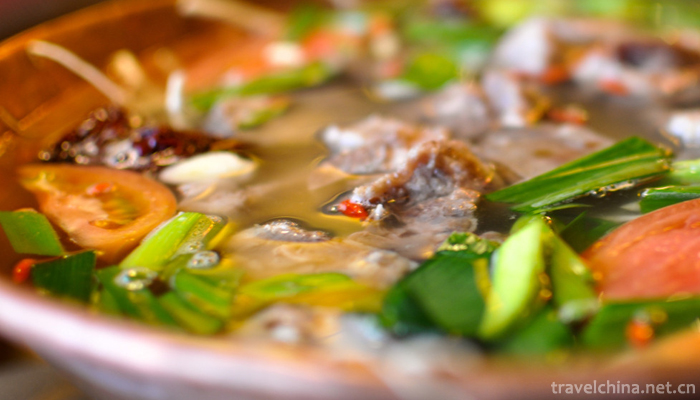
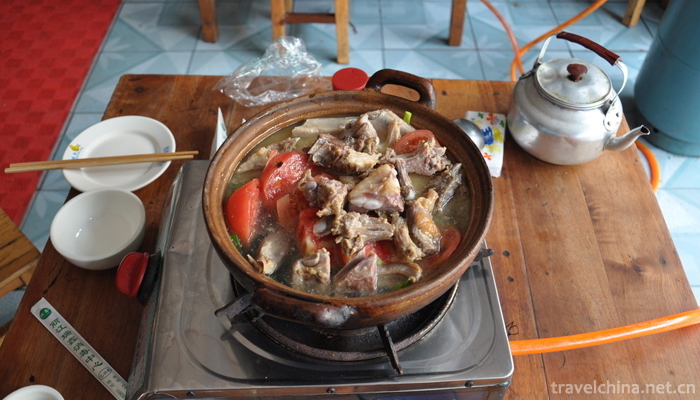
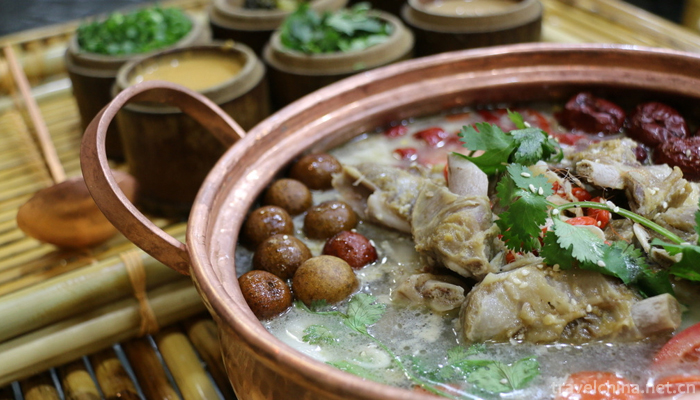
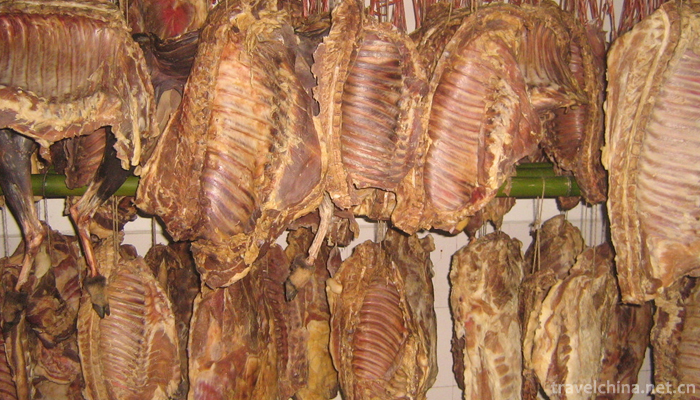
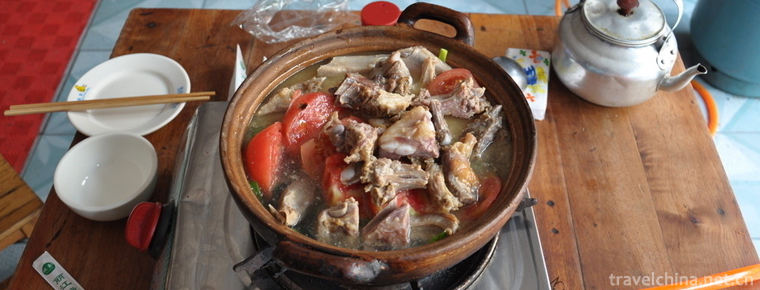
-
1.Shika Snow Mountain
Sheka snow mountain scenic area is located in the southwest of Jian Tang town in Shangri-La County
Time 2018-10-19 -
2.Vegetable party
Vegetable party (alias Su Chunjuan) is one of the common local traditional snacks in Guiyang. It can be seen almost everywhere in the streets of Guiyang. This dish is crisp
Time 2018-11-05 -
3.Mao tofu Fried bean curd
Mao tofu Fried bean curd is a famous traditional dish in Huizhou, Anhui Province, and is well known for its vegetarian delicacies at home and abroad.
Time 2018-11-27 -
4.Kongtong Mountain Scenic Spot
Kongtongshan Scenic Area is located 12 kilometers west of Pingliang City, Gansu Province. It overlooks Xi'an in the east, Lanzhou in the west, Baoji in the South and Yinchuan in the north
Time 2018-12-12 -
5.Qianwei ecological village
Qianwei Village is located in the middle of Chongming Island, 23 kilometers away from Nanmen Port, close to Dongping Forest Park. Once a desolate and silent village, now it has both urban scenery and
Time 2018-12-26 -
6.Changsha window of the world
Changsha World Window is located on the Liuyang River in the northeastern suburb of Changsha City, Hunan Province. It is a cultural theme park jointly invested by Hunan Radio and Television Media Co.,
Time 2019-03-17 -
7.Chu opera
Chu Opera, a local traditional drama in Hubei Province, is one of the national intangible cultural heritage.
Time 2019-04-18 -
8.Huang Di memorial ceremony
Yellow Emperor's sacrificial ceremony is a kind of sacrificial music and dance to celebrate Xuanyuan Huangdi's pioneering achievements in Chinese civilization. The theme of
Time 2019-05-04 -
9.Wool Textile and Rolling Techniques
Flower felt is the most popular among all ethnic handicrafts in Xinjiang, and it has a long history. Felt caps from the 1st to 3rd centuries A.D. are among the cultural relics unearthed at Lop Nur Lou
Time 2019-05-25 -
10.Bangkok in Puzhou
Bangzi of Puzhou is named for its origin in ancient Puzhou. Jinzhong and Northern Shanxi are called "Bangzi on the South Road" or "Bangzi Opera on the South Road", Shangdang is cal
Time 2019-06-09 -
11.Social undertakings in Luzhou
As of the end of 2018, Luzhou has added 1 provincial key laboratory, 1 provincial engineering technology research center, 4 incubators of science and technology enterprises above the provincial level, and 16 national high-tech enterprises. The annual output value of high-tech reached 38
Time 2020-12-14 -
12.Nanchong cultural undertakings
By the end of 2019, Nanchong has 10 cultural centers, 242 cultural stations and 10 public libraries. There are 8 museums, 28 cultural relics protection and management institutions, 18 national key cultural relics protection units, 112 provincial-level cultural relics protection units
Time 2020-12-17